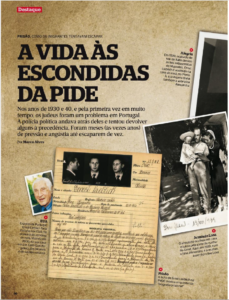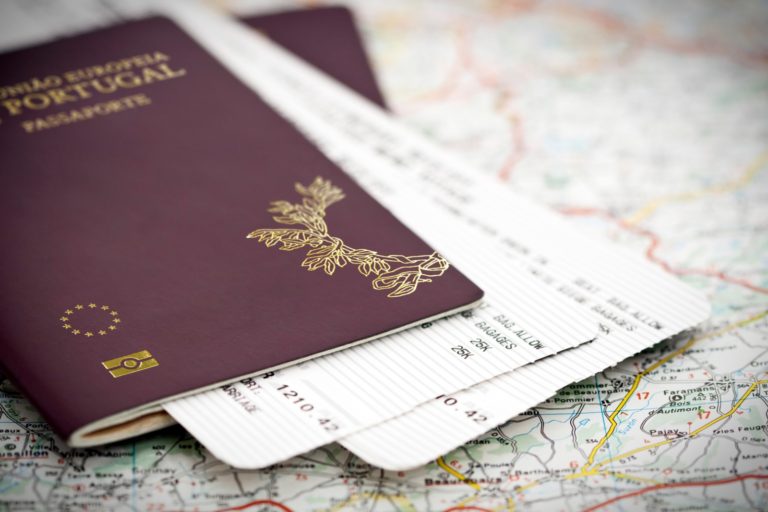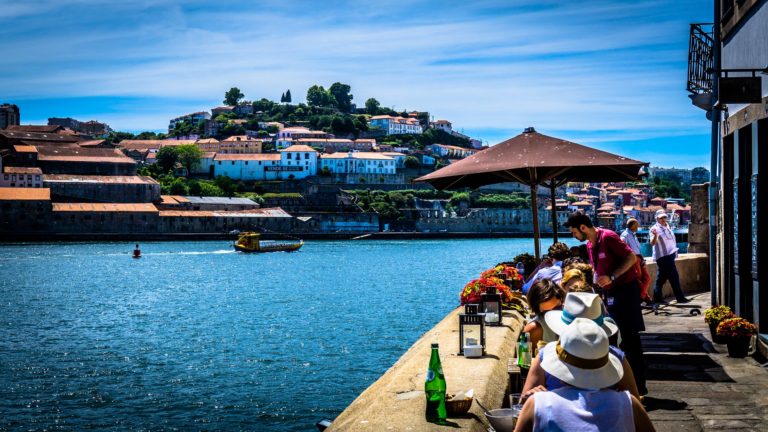
The Jews who were saved in World War II and the attitude of PIDE (International and State Defense Police) towards the Jews in Portugal at that time – fascinating stories about Jews who were saved by Portugal and keep a place of honor in their hearts.
At the end of August, a magazine article was published in the Portuguese magazine Sabado about Jews who lived or came to Portugal during World War II. Sabado Magazine is a weekly magazine that deals with social issues, historical research based on archival documents and the publication of opinion pieces and interviews.
The magazine’s article tells the stories of a number of Jews who were deported from Portugal or managed to immigrate to other countries outside Europe with the help of the Portuguese and thus their lives were saved. In addition, those Jews then maintained contact with Portugal and it took a special place in their hearts.
We chose to bring a number of stories from the article.
Architect Armenio Losa married Lisa in 1935, a Jew who moved to Portugal from Germany a year after Hitler came to power. Lisa had two brothers, one who had already moved to Portugal and the other, Ernest Leiblich who remained in the Lions’ den in Germany. In January 1939 Armenio asked for permission from Minister Mario Pais de Sausa regarding Ernest’s visit to Portugal for three months. He stated in his application that Ernest, who is studying in Italy, had already lived in Portugal from 1933-1934 and had an identity card and that he had a permit to enter the United States.
The Portuguese knew full well that the new government did not want Jews in Portugal so Armenio noted that his brother-in-law would stay in his house and he would pay his living expenses and not cause problems. The PIDE refused the request.
So, Ernest himself wrote a letter in Spanish to the director of the PIDE that he lives in Milan, that he is an artist and that he wants to visit his sister. His request was also denied. His requests were urgent because by 1938 Mussolini had already come to power in Italy and enacted a law prohibiting Jews from owning property and businesses.
Finally, thanks to Armenio’s good relations with the secret police, the request was approved, apparently by the minister himself and it was emphasized in it that the approval was given for only three months. Ernest did not leave Portugal and wrote a letter to the PIDE in which he begged to extend his stay in Portugal. Finally, with Armenio’s intervention, Ernest’s stay was extended every 30 days and he waited for approval of a US visa. In addition, Armenio gave Ernest the money he saved to buy a car so he could get to the US. Because his stay was over, he went into custody with many requests to go to consulates and try to get a visa. After months of hardship, on January 31, 1941, he was granted a U.S. visa and released 15 months after his first arrest.
Ernest died in 2009 and the Los Angeles Times wrote that he was a pioneer in selling coffee and snacks in offices, through the company he founded in 1967 with his wife. He was also a philanthropist. He constantly visited Portugal and always stayed at the Boa Vista Hotel in Porto. During his visits to Portugal, he built a collection of 47 works belonging to 22 novice painters who eventually inherited the daughters of the other brother, Fritz, and later moved into the possession of the Luis I Foundation. “The brother, Fritz, made a living here in Portugal,” recalls his niece, the daughter of Armenio and Lisa. “He was a traveling salesman, selling umbrellas and making a career in a shirt company owned by a Jewish friend.”
Lisa, his sister became a famous writer in Portugal.

Although the main protagonists in the article are Jews, the term rarely appeared in the files of PIDE, reflecting the lack of widespread anti-Semitism in the country and Portugal’s neutral policy towards Jews compared to other European countries. The most common word in the documents was “unwanted” which generally indicated the foreigners the government wanted outside Portugal for three reasons: criminal, political, or racist.
Sometimes such a distinction was made by eye. In 1943, Joseph Müller was arrested for secret entry into Portugal. He left Germany, moved to the Netherlands, Belgium, and then to Spain. This was a common route for Jews with the development of the war. The PIDE wrote of him: “Müller does not want to return in any way to the place he came from. It is worth noting that his appearance, terminology and German pronunciation are not typical of an employee who claims to work in a foundry, but of a well-educated person. The story of the trip seems fabricated; the man does not look like a Jew”.
Another vague reference to the Jewish status of the defendant was in the case of Walter Seligman who according to the report of the PIDE in 1940 was referred to as the German J. It is also an example of insensitivity in Portuguese police policy. The PIDE determined that he must return to the Netherlands, where his mother lives, which had already fallen to the Nazis. Seligman hid on the farm of Artur Varela Cid who fought for his friend. The idea was always similar, to stay in Portugal long enough to get a visa to the US and avoid deportation. Varela wrote requests to everyone he could, that he knew Seligman personally and that he was his employee. Seligman was released in February 1941 and sailed for Ecuador, where he made a career as an engineer and professor.
Franz Friedrich Fischler was arrested by the PIDE after accumulating many debts and did not pay the creditors, he fled Germany and wasted his family’s capital. The PIDE asked him to leave the country and he asked the German consul to intervene and pay his debts but without success. He was jailed for 19 months and released, when it is unclear how he paid his debts. Fischler became an actor and playwright under the name Franz Troburg and died in 1982.
There were other exceptional cases. Chil Zdanowsky, a former Polish citizen, was stateless in Portugal. He was arrested in 1941 after a Jewish refugee complained to the PIDE that he had extorted $ 650,000 in exchange for a residence permit in Portugal and allegedly in exchange for a visa to Brazil. It was also reported that there were other refugees who were cheated. Zdanowsky, 49, has lived in Portugal since 1912 as an independent commercial agent, as he said in an investigation. He was deported on July 27, 1942.
From these stories, it can be understood that Portugal also made it difficult for the Jews and wanted their deportation, but, still, in relation to the other European countries, its attitude on a practical level was a little more neutral.
At the same time, as is well known, Portugal recognized the atrocities of the Jewish people in Portugal and by virtue of this carried out the famous amendment to the Citizenship Law, which allows any Jew who can prove affiliation to deportation from Spain to enjoy the Portuguese passport, which grants European citizenship.
For more information – you can contact us.

 English
English



